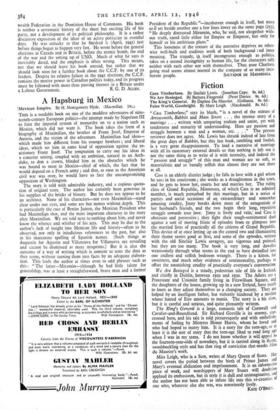A Hapsburg in Mexico
!Mexican Empire. By H. Montgomery Hyde. (Macmillan. 18s.) Tins is a readable book on one of the maddest adventures of nine- teenth-century European politics—the attempt made by Napoleon III to foist the imperial system of monarchy on to a nation such as Mexico, which did not want it. The book takes the form of a biography of Maximilian, the brother of Franz Josef, Emperor of Austria, and the victim of the adventure. Maximilian had ideas— which made him different from his younger brothers ; and liberal ideas, which set him in some kind of opposition against the re- actionary Franz Josef. The temptation to carry out his ideas in a concrete setting, coupled with an ambition, natural in an Arch- duke, to don a crown, blinded him to the obstacles which he was bound to meet in Mexico—chief of which, the fact that he would depend on a French army ; and that, as soon as the American civil war was over, he would have to face the uncompromising opposition of Washington. The story is told with admirable industry, and a copious quota- tion of original texts. The author has certainly been generous in his supplies of the bricks of history. But he does not appear to be an architect. None of his characters—not even Maximilian—stand clear under our eyes, and some are but names without depth. This is particularly the case of Benito Juarez, the Mexican President who had Maximilian shot, and the most important character in the story after Maximilian. We are told next to nothing about him, and never know the whence and whither of his acts. This may be due to the author's lack of insight into Mexican life and history—often to be observed, not only in injudicious references to the past, but also in his inaccurate spelling of Spanish names. (Such things as Augustin for Agustin and Villaneuva for Villanueva are revealing and cannot be dismissed as mere misprints.) But it is also the outcome of a way of writing which is content to state the data as they come, without turning them into facts by an adequate elabora- tion. This leads the author at times even to odd phrases such as this : " The latter—Miramon—although he had little talent for generalship, was at least a straightforward, brave man and a former President of the Republic "—incoherent enough in itself, but more so if set beside another one a few lines lower on the same page (255), " He deeply distrusted Miramon, who,-he said, not altogether with- out truth, cared little either for Empire or Emperor, but only for himself or his ambitious plans." This looseness of the texture of the narrative deprives an other- wise well-built and studious work of both background tnd inner meaning. The tragedy, in. itself incongruous enough as politics, takes on a second incongitiny as human life, for the characters tally neither with each other nor with themselves. Thus poor Charlotte going mad seems almost normal in the company of so many inco-


























 Previous page
Previous page